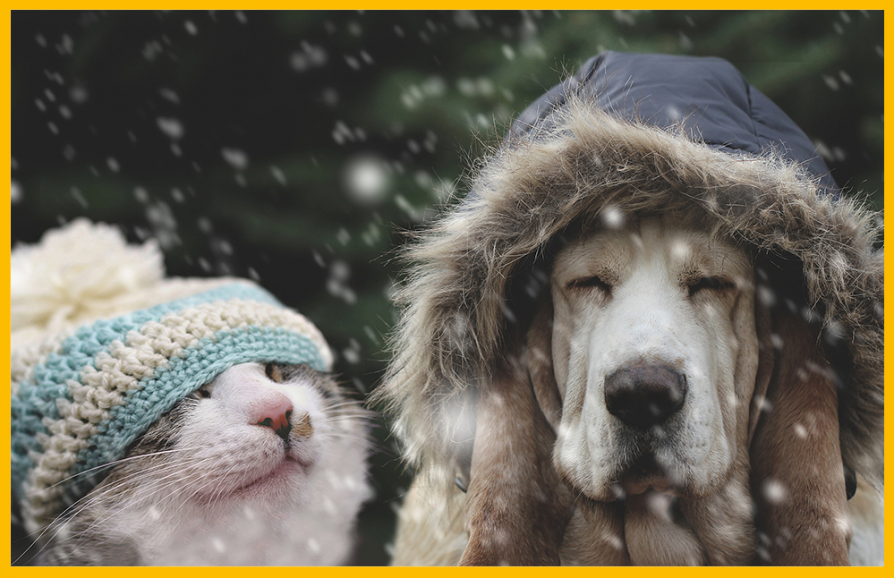How to protect your pets from the cold
- January 6th 2020

India is a country with many kinds of winter. It doesn’t get particular cold at all in Mumbai, it’s a little bit nippy in Bangalore, and it’s freezing up in Delhi and the rest of the north. If you live in a place with harsh winters and you have a beloved pet, here are some essential tips for taking care of your loved one this cold season.
After-walk paw care for your dog
Taking your dog for a walk in cold weather can be a hazardous experience, especially if you live in a part of India where it snows. Always make sure you rinse (with warm water) or wipe your dog’s paws off when you come home from a walk; that will ensure the snow or dirt doesn’t stay on and keep them cold. Make sure you do this before they lick their paws – you don’t know what’s been in that snow!
Moisturising in this season is also important. There are several balms available for your dog’s paws to prevent them from drying out or cracking in the cold season. Make sure you apply these after you bring your dog back from a walk, as it will help soothe their paws from the exposure to the cold.
Boots
Dog or cat boots are not always a favourite – pets don’t necessarily like wearing something on their feet and they can find boots very awkward to walk in. But if you’re worried about that depth of snow or that freezing weather, boots are an excellent way to keep your pet’s paws warm. Most boots are sock-like with a Velcro strap to keep them in place and are available in your local or online pet store.
Outdoor shelters for your cat
If you are pet parent to an outdoor cat, then think about creating a shelter they can use to keep warm. Outdoor cats don’t like being stuck at home and prefer to roam freely. An outside shelter means that they can take refuge from the cold as and when they like without coming into the house, which may make them feel trapped. There are cat kennels that you can buy that are suited for outdoor weather.
Just make sure these shelters are fitted with thick, warm and comfortable bedding that your cat loves, and you’ll have made your kitten a safe haven from the cold. Don’t forget to equip these shelters with feeders and water bowls , as your cat may need sustenance to keep their body heat up. If you live in an area where water is likely to freeze, you can also buy heating water bowls that prevent the water from turning into ice.
Sweaters
If you have a short-haired pet, such as Sphynx cat or a Greyhound dog, sweaters may be a wise investment this cold season. Short-haired pets do not have enough fur to keep them warm and need additional help. Not all pets take to sweaters, so don’t be worried if your dog or cat keeps trying to get them off – it just may not be the pet accessory for them.
That being said, some resistance to sweaters could be due to the material. Some materials may not sit right with certain breeds, or your pet may be allergic to the sweater you’ve bought them. Make sure you try as many sweaters as possible, of different materials, to see if you can find the right one.
Keep your pet dry
A wet coat or fur is more dangerous in the winter, as it can lead to your dog or cat catching a cold or developing hyperthermia. Always make sure your dog is dry after a walk. If you live in an area that’s prone to rain, even in winter, buy a raincoat to keep your pet snug and happy. If you have an outdoor cat, make sure you check on them as often as possible; look for signs of frostbite and hyperthermia. Even an indoor can get wet – leaning out of the window, upending their water bowl, sitting in a wet bathroom – so make sure you have a towel handy.
Base your decisions on your pet and their breed
Some pets, such as Huskies or Persian cats, are better suited to cold weather than other breeds. When it comes to protecting your pets from the cold, base your decisions on your pet’s breed and preferences. Does your dog have very short fur? If so, you may want to limit their time outside. Does your cat have a thick and luscious coat? If so, they may not need quite so many blankets, or heated bedding.
Essentially, look to your pet for clues of what they need. If they’re shivering or huddled or generally making themselves smaller, things may not be warm enough for them and you may need to take action. If you feel your pet has fallen ill due to the cold this winter, always take them to the vet to be properly diagnosed and prescribed treatment.
Comments
No posts found
